The United Kingdom and United States must actively manage their evolving geopolitical priorities if they are to preserve and strengthen their longstanding defence and security partnership, according to a new report by the Council on Geostrategy.
The publication argues that while both allies continue to recognise common threats—including rising military coordination between China, Russia, Iran, and North Korea—differences in regional focus and strategic priorities risk undermining the coherence of the so-called ‘special relationship’.
The report is supported by senior voices from both countries. Former UK Defence Secretary Sir Michael Fallon and retired US Admiral Harry Harris both issue forewords, calling for a more deliberate effort to modernise the alliance for what Fallon describes as “the new geopolitical age that we must face togetherâ€.
The report notes that while the UK remains heavily focused on Russian aggression in the Euro-Atlantic, US attention is increasingly dominated by the Indo-Pacific and the military and technological challenge posed by the People’s Republic of China. This divergence is not necessarily problematic, the report finds, but must be actively managed if the alliance is to remain strategically effective.
“The alliance can prosper even if we prioritise different theatres,†said Dr John Hemmings, Deputy Director for Geopolitics at the Council. “I’m less sure it will prosper if we disagree on our adversaries. At the end of the day, this is core.â€
In outlining a path forward, the report calls for deeper collaboration on military production, rare earths supply chains, and emerging technology regulation, while also urging both governments to maintain flexible regional strategies and enhance defence industrial cooperation.
Among the key areas of convergence identified are shared concerns over the limits of globalisation, the re-emergence of great power competition, and the need to rebuild defence industrial capacity. These shared factors provide a strong foundation for renewed cooperation, the authors argue.
Sir Michael Fallon warns that the UK must be prepared to shoulder more of the burden in NATO if the US is drawn further into Indo-Pacific contingencies. “Britain needs to be ready to increase its commitments… if and when any American troops and assets are more urgently required to defend their own homeland,†he writes.
Admiral Harris, formerly Commander of US Pacific Command and later Ambassador to South Korea, adds that the alliance should not be taken for granted. “Geopolitical shifts, technological advancements and economic realignments… necessitate a reassessment of the traditional dynamics between America and Britain.â€
The authors conclude that, despite the growing pressures of global competition, the UK and US remain each other’s most important allies into the 2030s. The challenge now is to update the relationship to ensure it remains fit for purpose in an era of accelerating geopolitical change.





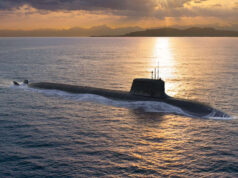

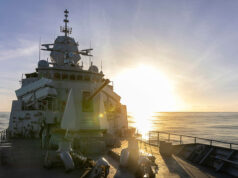
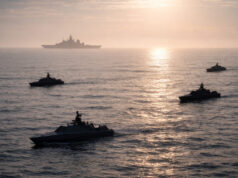
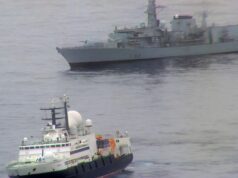
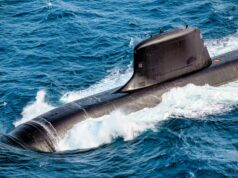
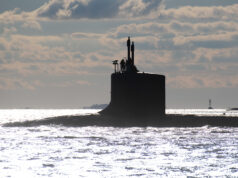
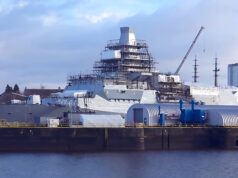

Assuming the UK does increase military spending to 3.5% of GDP we are going to end up with quite a substantial force. Running a back of the fag packet calculation that might equate to something like over 350 fast jets, 30+ surface combatants and an army back to 120,000.
Given the low recruitment numbers and difficulty retaining people nowadays I’m not convinced we can spend as much as 3.5% of GDP without some form of draft.
I don’t know it depends on focus…because we have some areas of we really need to work up hard
Just capital wise
1) the conversational strategic deterrent.. we do need lots of long range missiles.. the ability to fling stuff and hurt Russia is a huge requirement.. those 2000km+ missiles are going to costs a fortune…7000 long range cruise missiles.. that’s 15-20billion
2) air defend including ballistic missile defence.. they have put 1 billion down but a worthwhile one will be a good 5-10 billion
3) surface fleet.. the plans are there to get it to 19 again.. but it needs to be 30+ that’s another 5-10 billion
4) an extra 5 SSNs over present numbers.. and replacement for 12 total.. your looking at 50million
5) nuclear arsenal expansion and rebuilding 15 billion..but I bet they will need to double the size of the stockpile so another 15 billion on top…
Essentially you can eat 100billion in extra capital costs before you get to the RAF and 6th generation fighters or the army. Tempest has a 12 billion budget to replace around 100 typhoons.. so if you say purchase another 70 f35 that’s 7-8 billion and then if you double the tempest order to 200 your looking at about 32 billion in fast jet recapitalisation… that’s a lot. To be honest I would be happy with 6 F35 squadrons and 6 tempest squadrons.. for around 250 fast jets.
Sure but worth remembering that according to the government all the extras like 12 SSN’s and 7000 cruise missiles where factored in on a spending profile of 2.5% raising to maybe 3%. Also a large part of our spending 0.3% is going on Ukraine aid which won’t last forever.
You could be looking at something close to a doubling in core military spending over a sustained period but having an inability to double the manpower.
We already have one of the highest equipment spends in the world.
Important to avoid the same kind of cluster f**k we had with DFID were they were pissing money up the wall to spend the 0.7% each year. We also need to avoid becoming uncompetitive like US defence contractors.
There is only so much stuff a service based economy with full employment can actually make. 1.5% of GDP extra that we have now committed to is an insane sum of money £45 billion a year. That would pay for the entire Trident renewal program in 1 year. You could replace every fast jet in the RAF every 6 months with that amount of money. You could buy a new Queen Elizabeth carrier class each month.
What an absolute rubbish post, full of contradictions and pure crap
Two problems;
– where is the existing real baseline; and
– what is actual free cash being allocated?
I’d have been happier with a smaller real cash increase in funding.
I wish I were as optimistic as you.
This government will not increase military spending as you think of it to 3.5%. It has agreed to raise NATO-defined defence-related spending to 3.5% by 2035, which as far as the PM is concerned is after he’s gone. UK military capability spending is currently running at maybe 1.8% at best assuming you include nuclear spending. We know that the next increase of 0.3% in 2027 will be roughly 0.2% going to military and 0.1% to security, because the PM has said so, and that’s the best we can expect. He has also said that 2.6% is it for this parliament. I believe that Sir Keir will do nothing this parliament to prepare us for an influx of cash next decade.
How the outstanding 0.9% expected to come between 2029 and 2035 will be spent nobody knows. There’s also another 0.1% ish that’s currently going to Ukraine, which should come back to the UK in the same time period. We are looking at an extra £28bn a year in 2025 money. I’d want it to be spent on conventional military capability, but I doubt it will. It’s in the gift of whichever shallow grandstanding politicians we elect the next time around and indeed the time after, and will be divvied out accordingly if it’s divvied out at all.
Truly unfortunate that NATO did not adopt a realistic set of graduated goals for direct military spending between 2025 and 2035. One logical approach would have been to increase the goal by 0.15% of GDP each year, to yield a final value of 3.5% of GDP by 2035. Certain countries would still flout the requirement (e.g. Portugal, Spain, etc.), but those countries may be subject to moral suasion by the NATO perimeter countries (e.g., Baltic states, Nordic countries, Poland possible selective additional countries) which take the threat assessment seriously. The 1.5% of GDP goal allocated to defence related expenditures will predictably be fulfilled by all 32 countries. The category will be substantially meaningless, subject to all manner of symbolic projects.
If/when the CRINKs break through the front line states, the conflict may become exceedingly grim for unprepared rear echelon countries,ala the Blitzkrieg tactics of the Wehrmacht. Even if The Donald or kindred spirit is not the POTUS, it would be dangerous to assume substantial US reinforcement during this conflict. Reasonable to assume/confidently predict US will have its ass handed to it by the ChiComs in a simultaneous conflict in the I-P, at least while it remains conventional.
Truly hope that you Brits are intelligent and courageous enough to undertake serious rearmament, both conventional and nuclear, during this period of the gathering storm, before the onslaught begins. Simply being an island 20 odd miles off the coast of France, will not afford much protection for this round unfortunately.
Fantasy fleets.
When is this stuff going to be ordered?
To be honest I think we should spend in the future 3% GDP – core defence spending. I also think that figure would be more of a realistic figure for NATO on the whole or for many NATO members, even that will be a push for some. But I really mean 3% on defence – Too much smoke and mirrors going on..
Fcuk. And there’s me thinking you had overdosed and we were going to be spared rubbish posts like this
Ouch !
ðŸ˜ðŸŒž
I think they could get back upto a reasonable sized military again. The recruitment process subcontracted out has become a joke. It needs to be no more than 4-6 weeks to get enrolled within the military.
The NHS completes back ground checks for very sensitive roles with lots of security and safeguarding issues within that timeframe so the military should be able to do the same.
Retention- quality of armed forces accomodation needs to massively improve- the government acknowledge this and are taking steps to sort it out. Pay- going up and the military are getting a fairer pay settlement.
Skills and training for armed forces personnel – this is what a lot of people join up for, to be trained to do a role that might have applications outside of the military when they leave.
Military covenant – needs to be better protected and enshrined in law far too many ex military personnel don’t receive the support for housing, psychological welfare, prioritised access to healthcare they should.
We expect the military to fight and risk their lives for our country so we have to look at ourselves why there is a recruitment and retention problem.
It’s an interesting paper that highlights one key point.. the utter and catastrophic failure of Neoliberal economic models in combating a Mercantile power. Essentially the mixture of a Nationalist Communist state that is willing to engage in a Mercantile approach completely negates the Neoliberal free market approach.. basically the free market globalisation only works amongst peer free market states that are willing to have some form of baseline rule set….
The paper at its core recommends the ending of the Neoliberal free market and that western Nations adopt a mercantile approach to the rest of the world and only have a free market approach in the west and internally … this is actually a big problem for the UK as it has a very limited internal mark..and essentially the EU and US have an advantage of large internal markets with a great deal of built in protections ..this is an essential point of possible divergence between the UK US and EU and does need addressing or the Uk will be forced to fully engage with china and its satellite markets to stay viable..the Uk either sacrifices its own economy, retains its globalist approach ( so strengthening the authoritarian Mercantile states ) or the EU and US need for give around free markets. This is essentially the same for nations such as Japan, Canada, NewZealand, Australia and Korea.. their need for markets essentially bleeds the west and strengthens the authoritarian Mercantile states.. only the US and EU can answer this by dropping the protectionism in their large markets.
The other interesting point raised is strategic divergence between European nations and the U.S.It is actually helpful in that it highlights that US Pacific tilt is not really about getting pissed of with Europe ( although US political systems play it that way) its the fact that the U.S. can no long look both east and west and expect to win.. it makes it very clear that there is a very good chance the US will be in an existential war and it will need every resource it has to fight in the pacific if that happens.. essentially the US cannot both participants in Europe and fight china.. it is essentially because the U.S. has now hit the same point the British empire did.. it cannot protect all its areas of interest. And the UK and rest of Europe needs take over Europe.
Now this is where I disagree with the paper a bit because it essentially says the UK needs to be everything the US needs in a partner and I simply believe it’s unrealistic for the UK to do everything in the paper. The paper basically states that the UK needs to fill the leadership void in European NATO, and focus on the wider global picture such as sea control in the western Indian Ocean as well as support the U.S. in the pacific..
So leadership in NATO from the UK ? it also says that Germany and Poland need to take on responsibility for land security of the western NATO border.. now I’m sorry I don’t for a second think the power houses of the EU will take on responsibility for western border security and then say OK let’s have the UK provide the leadership.. not happening, when the U.S. pulls its resources from Europe to the pacific leadership in Europe will pass to the EU.. I think anything else is a fairytale..yes the UK and US may not want that.. but Germany, France, Poland, Italy etc will insist. So in regards to leadership in European nato I think it will be based around the EU and the UK will get to Co-ordination of the artic and leading on North Atlantic security…I suspect the French will end up with the Mediterranean and North Africa as their lead area. But the heart will be the EU.
As for the rest.. it does not much mention France and Italy in regards to the Indian Ocean.. but I suspect the UK,France and Italy will need to work together around the Indian Ocean and what that looks like. Finally UK involvement in the pacific… this is beginning to really stress things a bit and I honestly think the UK may need to pull back and say not something we can be involved in..if the UK has to lead in the north, lead in the North Atlantic as well as secure its significant interests in the south Atlantic as well as be a major European player in the Indian Ocean it does not have enough to be in the pacific…
Essentially I think this gives a picture of what a new NATO needs looks like.. essentially a liberal democracy club that supports and looks to enhanced strength through protectionist trade within itself and a profoundly mercantile approach outside. But with an understanding that different parts of the Alliance focus on different area.. Most of Europe focused in on the eastern border.. the U.S. focused on western border, with the UK focused on the northern seas and oceans, supporting the wider Indian Ocean mission and its own south Atlantic requirements.. but with that understanding comes the fact the US will not get significant support in the pacific from Europe and the European nations will not get significant support…not because of a falling out or unwillingness to support but because we need to accept and acknowledge that NATO has two borders a half a world apart and it’s just not strategically viable for NATO nations to focus on the border that is an ocean away from them. That is also a NATO that you could invite the liberal pacific powers into ( a sort of NAPTO)..personally I think an extended Atlantic/Pacific alliance..with set areas of responsibility may be the only way to go with increased Chinese, Russian mutual support.
Britain taking the lead US replacement role in Europe is just politically easier even if Germany was the biggest spender. As the UK is in five eyes it has full access to an intelligence picture that Germany will never get.
It also has decades of fighting experience that no one in Europe can match. The UK has deployed divisions sized forces four times since 1982. France maybe twice and Germany has never deployed anything at scale.
US forces have served under British command many times. Zero chance the US would allow its forces to be under German of Polish command.
maybe the baltic countries including poland are taking defence seriously. germany has been taking a free ride for decades.
Agreed, w/in foreseeable future, UK will have limited assets available to provide assistance in the I-P. Possibly a CSG, SSN(s), an RAF strike package and SF in the case of direct threat to Australia or New Zealand (possibly including Brunei, Malaysia, Singapore. An Astute or AUKUS class operating as a commerce raider could significantly inconvenience the ChiComs, and AUKUS class, if equipped w/ SLCM-N, would represent a significant potential existential threat.
Who remembers that DIY Stencil rubbing art, you know, the one where you had a blank background like a Zoo and you rubbed a pencil on the back of an animal transfer ?
I used to love adding different animals to a Zoo theme.
Looks like the Nimitz is finished, now for the QE. Shall we add Harriers ? how about some “Sea Typhoons”, or “Tomcats” ?
Look, It’s Friday, It’s been a long week and I’ve had too much Sun.
In WW1, USA had a population 2.5x the UK, in 1939 3x, now 5x. Even in WW2, with all the imperial resources added, Britain became the junior partner. Now the differences in population, economy and military budgets really make a full partnership impossible. As long as Britain clings to some kind of global role, it will be massively inferior to the USA. Focussing on the UK and its near abroad would allow us to broadly match any resources the US would deploy in the region. That could be a real if limited partnership.
Yeah, but we’re now ten times more lethal — so factor that into your calculations please.
How could I have overlooked that? 😄😄
Come on that’s the baseline I reckon they could get to 15 times
Personally, I think far more ‘accurate’ facts and figures need to be compiled, regarding why people are leaving the armed forces in droves. This needs to be done before anyone even considers ramping up recruitment.
The wages for armed forces personnel, is way below what it should be. People today, need more of an incentive to join the armed forces. That, coupled with the notion that they may be asked, to kill for King and country one day, requires a little more than £26,000 a year.
When all the ‘addons’ are taken from their wages, the fact that they have to pay for their own food, etc etc see’s that £26k whittled down even more. Frankly the salary is crap.
A young person can earn far more money on a building site, in a tarmac gang, even in a factory somewhere. Plus, they are not expected to put themselves in ‘harms’ way.
The 4.5% increase in salaries sounds good, however its been stagnant for years. A lot more work to be done.
Yes, exactly and, oh, but hang on, It’s pretty much always been the same “Starting pay” is the first step in any proffesion, you earn more with time, experience and usefulness. This is the way of life unless you are born “Fortunate”. Out of all starting pay normally the basics are taken, things like food, clothing, housing, beer, makeup, fags, vapes, iPhone 657 “Babe” (Love Island Edition), Debdts and student loans (if applicable). So no different in the armed forces than in civvie life really.
The “Kill or be killed” part is the fundamental factor of joining up in the first place, not how much money you can stash.
But as in all proffesions, wages are never enough to start with and that makes a person “Strive” to better his/her lot.
“Ask not what your country can do for you”.
Notwithstanding what was said in the SDR about the primacy of the Euro-Atlantic area to the UK, is it reasonable to say that the British Army and the RAF should prioritise that area (the NATO area) and do relatively little ‘Out of Area’, but that the Navy can and should conduct periodic deployments to the A/P (and other regions of the world), if it does not conflict with tasking in the NATO area.